Extreme heat during the summer months threatens your mental health! Ways to protect your mental health have been explained...

Clinical Psychologist Merve Öz discussed ways to protect your mental health during the summer months. With rising temperatures making it difficult to even breathe, Öz explained that hot weather poses a threat to both physical comfort and mental health. "It's known that heat can affect a person's productivity and performance in simple tasks," she said. "Furthermore, exposure to extreme heat can also affect decision-making."

Öz noted that the effects of temperature changes on mental health may vary depending on gender, age, and socioeconomic status, saying, "High temperatures have direct and indirect effects on mental health indicators such as depression and schizophrenia, as well as substance abuse. Additionally, sleep disturbances, weakness, intolerance, apathy, and a general feeling of fatigue can also occur."

Öz explained that one of the biggest impacts of hot weather is sleep, saying, "Not only does the quality of sleep decrease, but the duration of sleep also decreases. This reduces work productivity and quality of life, while also decreasing tolerance levels and making anger management more difficult." He also reminded that insomnia can trigger manic episodes, particularly in individuals with bipolar disorder.
"THOSE WITH PANIC DISORDER MAY MISUNDERSTAND COMPLAINTS"Öz pointed out that high temperatures can increase heart rhythm, leading to feelings of anxiety and fainting, and that people with panic disorder, in particular, may mistake these physical symptoms for panic attacks. "When such a situation occurs," he said, "they should try to calm themselves by reminding themselves that these symptoms may be due to heat."
Öz explained that the already existing reluctance of depressed patients can be exacerbated in hot weather, saying, "For depressed people, even getting out of bed and washing their face is a form of cruelty. At the core of depression is a reluctance to engage in daily activities once enjoyed, a loss of enjoyment of life, and a depressed mood. By exacerbating the already existing reluctance in a depressed patient, heat can exacerbate their depression."

Öz, who stated that high temperatures lead to distraction and poor anger management, reminded that angry outbursts can occur more frequently in hot weather, saying: “Hot weather can increase angry, aggressive, and even violent behavior. To manage your anger and control your temper, be aware of your anger. Think before you act out in anger. What is the situation that really makes you angry? Why and where are you projecting your anger? Be sure to ask yourself these questions. When you're angry, you can take deep breaths and do breathing exercises. Choose a place, either real or imagined, that makes you feel safe and happy, and imagine being in that place when you feel angry. The combination of caffeine and hot weather can make it difficult to manage anger. Therefore, limit coffee and tea in hot weather. If you can, cut out tea and coffee completely and make sure you get enough sleep. Regular exercise is also important for anger management. You can also try yoga and meditation to relax.

Expert Clinical Psychologist Merve Öz listed her suggestions that may be beneficial for everyone, especially those with underlying psychological disorders:
-
On hot summer days, avoid going outside between noon and 2 p.m. unless absolutely necessary. If possible, try to spend the summer months in higher, cooler locations. In extreme heat, avoid stressful environments like traffic as much as possible.
- Even if you have to go out around noon, wear a hat and sunglasses to avoid excessive sun exposure. Choose comfortable clothing.

-
Take a warm shower to relax. You can also sprinkle a drop of lavender oil on your pillow to improve sleep quality. Drinking lemon balm tea regularly before bed also improves sleep quality. Try to avoid coffee, tea, and green tea in the evening, as these beverages can disrupt your sleep.
-
Since weakness, fatigue, dizziness, and apathy can be caused by electrolyte imbalances, be sure to drink plenty of fluids. Also, if you don't have any restrictions on soda consumption (such as high blood pressure), you can consume one soda per day these days.
-
Avoid a heavy diet and consume foods with high water content, such as fruits and vegetables. Plan activities you can't do during the day due to the heat for the evening. If you plan to exercise, opt for evening or early morning hours.
- Please keep the feeling of empathy with you these days.
(DHA) This content was published by Sedef Karatay
mynet





